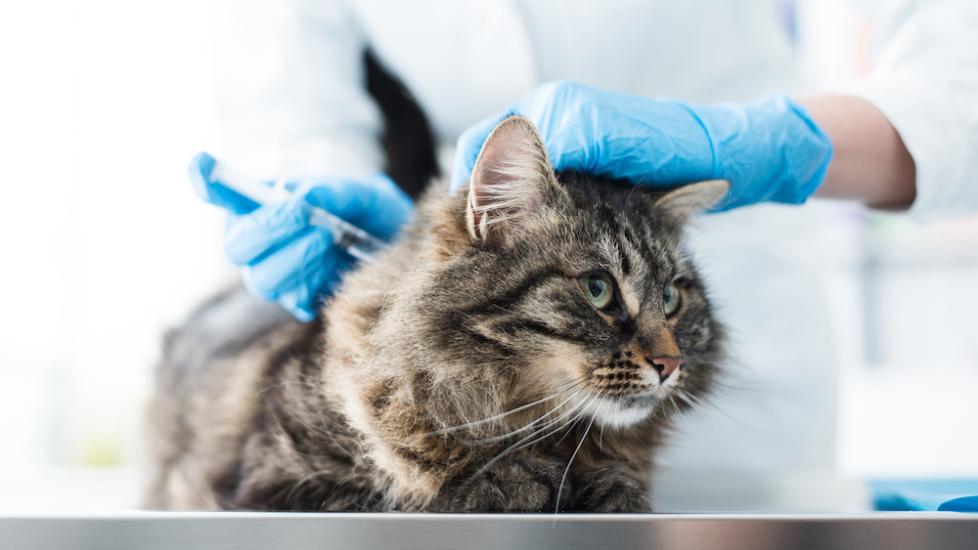12 Possible Vaccine Reactions in Cats
What Is a Vaccine Reaction in a Cat?
Vaccines are powerful weapons in the war against infectious disease. They are cost-effective, commercially available, medically sound, and have an excellent safety record. Life-threatening and debilitating diseases such as feline distemper, FeLV, and rabies can each be prevented with a simple injection.
Vaccines trigger the cat’s immune system to develop antibodies that can help fight off the infection, should the cat be exposed in the future. They can lessen the severity of future disease or prevent it altogether, but adverse reactions, though rare, can occur.
Vaccine reactions are unpredictable and unanticipated—if they occur, it does not mean that the vaccine was administered inappropriately or that the vaccine was faulty. It has been estimated that reactions occur in 0.52% of cats, or 52 in 10,000. This happens when an exaggerated or inappropriate immune response develops as a result of an allergen or antigen or, in this case, the vaccine.
Symptoms of Vaccine Reactions in Cats
Vaccine reactions in cats are rare, but when they occur, the effects can range from mild to life-threatening. They are more likely to occur within a few hours after the vaccine has been given, but can occur as much as several days afterward.
Most commonly, you will notice:
-
Mild soreness or tenderness at the site of injection
-
Lethargy
-
Decreased appetite
-
Slight fever
-
Localized swelling, which can range from mild tenderness to hair loss to a distinct lump (this may be noted weeks to months later)
These symptoms are usually self-limiting and shouldn’t raise too much concern. However, you should contact your veterinarian if any of the above occur. Any lumps that develop should be examined by a veterinarian and biopsied, if necessary.
A much more severe form of vaccine reaction is anaphylaxis (allergic shock). Symptoms of this life-threatening condition include:
-
Vomiting
-
Diarrhea
-
Facial swelling
-
Hives, or urticaria
-
Facial or whole-body itching
-
Respiratory distress
-
Shock
-
Death
FISS, or feline injection-site sarcoma, a rare form of malignant cancer, has been linked with vaccines. The rate of this cancer is low, occurring in less than 1 in 10,000 cats, and was initially thought to have occurred due to adjuvants (material included in the vaccine that aids in creating a greater immune response). Recent studies have determined this not to be the case and have also shown that FISS can occur with injections other than vaccines, such as subcutaneous (under the skin) fluid administration, insulin injections, and even with microchip implantation.
Most Common Vaccine Reactions in Cats
The most common vaccines recommended for cats include:
-
FVRCP (feline viral rhinotracheitis, calicivirus, and panleukopenia) or feline distemper: This vaccine helps protect against contagious upper respiratory and GI infections. Most notably, panleukopenia is often fatal and may have longlasting debilitating effects on those that survive.
-
Rabies: Rabies is a highly contagious virus that affects the nervous system, has a 100% mortality rate, and is also contagious to humans. This vaccine is a legal requirement in many U.S. states.
The above vaccines are considered “core,” meaning that all cats should receive them regardless of lifestyle. The FeLV vaccine is considered a core vaccine for kittens and non-core for adults, as the potential for future environmental and lifestyle changes is greater for kittens than adults. FeLV is also a fatal disease that affects the lymphoid tissue and bone marrow, eventually causing immunosuppression and cancer.
Regardless of which vaccine is given, any vaccine has the potential to cause an adverse reaction with the symptoms noted above.
What Are the Treatment Options for Vaccine Side Effects?
As noted earlier, most vaccine reactions will occur within the first few hours after vaccination. Please contact your veterinarian and seek medical attention immediately if needed.
Most cats with mild signs may benefit from warm compresses or a dose of pain medication prescribed by your veterinarian. Depending on severity, your cat may require hospitalization and medical care in the form of certain medications and IV fluids. Oxygen therapy and medications such as antihistamines (diphenhydramine), steroids (dexamethasone, prednisone), and epinephrine may be given.
How Can You Keep Your Cat Safe During and After Vaccinations?
Despite the risks of vaccination, it is more important that your cat be vaccinated than not.
Not only is vaccination recommended by the AVMA (Amercian Veterinary Medical Association), AAHA (American Animal Hospital Association), and AAFP (American Association of Feline Practitioners), but vaccines decrease the risks of potentially life-threatening diseases, some of which are contagious to humans (zoonotic). Vaccination is part of being a responsible pet parent.
If your cat is immunocompromised or is affected by an autoimmune disease, it is recommended to discuss with your veterinarian the risks and benefits of vaccination and any protocols that may be needed. This is also true if your cat has suffered a reaction in the past, as vaccination can exacerbate the condition. Overall, the decision to vaccinate should be on a case-by-case basis in partnership with your veterinarian.
References
-
AAHA/AAFP. Feline Vaccination Guidelines.
-
Iowa State University. FISS.
Featured Image: iStock.com/demaerre
